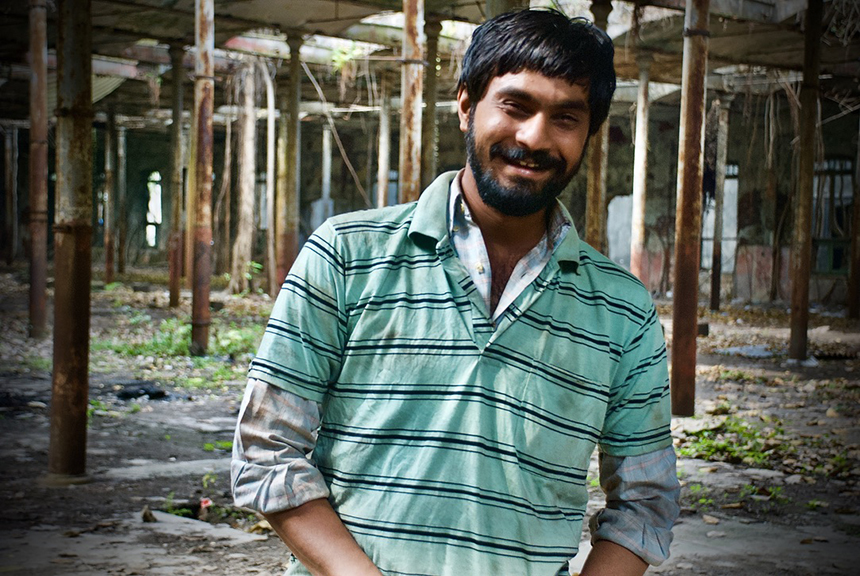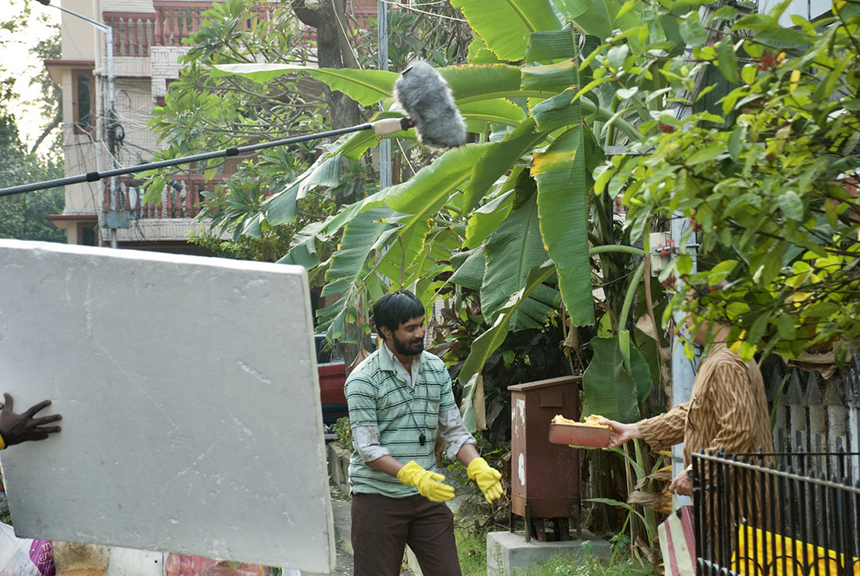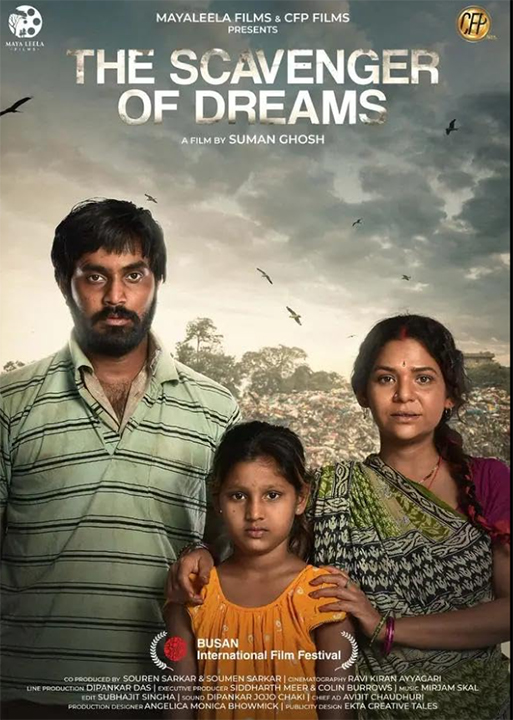Ashley Tellis meets actor Shardul Bhardwaj who holds up hope for the world of cinema and theatre on the eve of the release of his film Scavenger of Dreams
In early 2021, four sewage workers in Kolkata were murdered while desilting a sewer line in Kudghat. This report in Down To Earth tells us the usual story about why this happened. Lack of safety, lack of equipment, breaking of the law, indifference to the lives of the poor. Suman Ghosh who lives in Florida read about the lives of an allied group, garbage collectors in Kolkata and was inspired to make an extraordinary film called The Scavenger of Dreams (2023) about it which releases this week in Kolkata and Bombay. At the heart of the film is an upper caste, upper class actor called Shardu Bhardwaj whose life, as a young actor in Bombay, just like Suman Ghosh’s life in Florida, has nothing to do with the lives of garbage collectors in Kolkata.
We have to be grateful for Ghosh and Bhardwaj because people like them are hard to find in the film world. Lazy identitarian critiques of their caste and class privilege miss the point. They could just as easily be leading fat cat, middle class lives in their respective contexts. However, they are not, and we need to be grateful that they instead show us a world we need to see (and by we, I mean you and I, middle class readers of this article on Groundxero.
I set out to find out what makes Shardul Bhardwaj click, who is he, what does he do when he’s at home, who formed him, who created this anomaly of a boy in the utterly mediocre context called the Bombay film world. In the first instance, it was The Players, an amateur student theatre group in Kirorimal College, led by the likes of founder Frank Thakurdas and helmsman for decades, the recently retired, and redoubtable, Keval Arora which and who formed him.
Bhardwaj has begun thinking of the Players again recently. He says “As I think back now, which I have been doing a lot these days, the reasons remain unclear. I think an outward expression of any form of performance I think was in the fantastical stories that I used to recite to my friends or family to make my life sound more exciting than it actually was. Simple exaggerations like how an ant bit a German Alsatian and he went crazy. The important thing in this story for me at that point in time was that I and only I saw the very moment when the Alsatian started behaving crazy. That dog was quite a feared character in the apartment complex I grew up in. These little lies weren’t really appreciated at my house. They in their wisdom and care for me would admonish me. But I think that was the real foundation of performance, to make the other person believe. To really test the boundaries of imagination. The Players, I think, really showed me that this gentle peppering was a performance. We used to and still revel in some harmless salt and peppering of stories. The place had a rigour to theatre. It wasn’t just another extracurricular activity. It was THE activity. One couldn’t just saunter in and out of the place. One had to commit to it and maybe in a way that seemed too tough for me in the first year. By the second year, with a lot of help from peers and Keval Arora it became clear that I wanted to do this. Because I don’t see any other reason for letting three years of undergrad pass you by in the rehearsal room.” Unlike most of The Players, Bhardwaj claims he did attend class. He really enjoyed his Literature degree, he says, as “A lot of what one studied in terms of Latin American and African literatures is what pushed me into the newer directions in terms of narrative structures” but it was, as with many actors in The Players that he got a real education, a real degree.
Good actor that he is, he went on to FTII, that other foundational institution, despite the best efforts of successive governments to destroy it, even as it was the state that created it. Bhardwaj then went to bad, bad Bombay and, ironically enough, it taught him community. He says “Right when FTII was getting over, I got a call to assist on Ivan Ayr’s critically acclaimed film ‘SONI’ thanks to Gurvinder Singh. I assisted on it with some friends and absolutely wonderful director writers like Kislay and Gautam Arora. Made some lifetime friendships like with Saloni Batra. I have been particularly lucky in being part of communities. The FTII community and the Players community who gave me food, shelter and however cheesy it might sound ‘Love’. Of course, I had friends outside of this ambit too who helped immensely. Mumbai can really get lonely if you don’t know people. I still look at boys and girls walking on the JP Road, right next to Araam Nagar and I just wish they are walking to a friend’s home. There is somebody or some people that they have. I would sincerely be nothing without the ecosystem that has really nurtured me, scolded me when I go wrong and has built me many times when I have crumbled.
One of the results was one of the most underrated and brilliant films of our time, Eeb Allay Ooo! about the lives of another marginalised community. How did this miracle of a film even happen? Says Bhardwaj “It came about as part of the same ecosystem that I mentioned above. Prateek had taught me at FTII and I knew him from before because he had also been at The Players much before my time. Both FTII and The Players have had this tradition of people coming in and interacting with current students. This leads to a lot of sharing of ideas and arts practices. I think a film like Eeb which was so difficult to make can come about only when there is immense trust and camaraderie amongst the makers of the film. This camaraderie cannot arrive on the day of the shooting. These are relationships that one nurtures and lives with on a daily basis. I mean look at the credit list on this film. It has some of the finest names working in Indian Cinema today : Shubham (Writer), Saumyananda Sahi (Cinematographer), Bigyna Dahal (Sound) and Tanushree Das (Editor). I was fortunate to have been amongst one of these. I still consult all of them when a new idea for a film or a play comes.”
Yet one has to survive Bombay’s rents, go out and party. He made some truly shitty films to bring in the moolah like Kuttey but ask him about it and all he mentions are the friendships. When I ask him why he did, and is doing, commercial shit, he says “If you are talking about Trial By Fire and Kuttey then, yes, in terms of the scale and studio backing, they were commercial. Barring the madness of big sets the ethos remained the same. Somu and I worked together on Trial and I found a life long friend in Prashant Nair. Aasman Bhardwaj and I found a lot of common ground while shooting Kuttey. On that set with stalwarts all around I think it was me Aasman and Radhika Madan who sometimes would be hearing all the others with a dreamy eye.” He’s being disingenuous, of course. Nothing can save Kuttey from the dustbin of history, nothing can redeem it from its sheer mediocrity. But then the OTT and independent scene also produces a short like Next, Please in which Bhardwaj produces an underrated stunner of a performance.
But that is rare. How does he navigate the stultifyingly monolithic and hegemonic (where only a few studios run everything) Bombay film industry, I ask him. This is what Bhardwaj says: “In my little time in Mumbai (8 years) I have been awarded with a lot of faith from Directors, producers and creators. It was during the end of the first lock down I got a call from Pranati Nagarsheth (co-founder of Pink Window Productions) to do Nitya Mehra’s Unpaused for Amazon. At that time, it was pure mayhem in terms of work. She asked me to quote a number and I did. She responded with a laugh, and gave me more money than I had quoted. I had quoted an abysmally low number because I, like many others, was desperate. She did not prey on my desperation, she offered me dignity and reminded me to never lose it. There are innumerable such stories I have of people in the Industry who have gone out of their way to fight for me to be in the film or the series. These stories give me a lot of hope and are a little vote of confidence about my choice of work and my way of working. So, that keeps the hegemony and all the rest a little tolerable.”
Unpaused is also a crock of shit. The segment Bhardwaj is in, a sentimental tale about Hindu-Muslim bhai-behen is only saved by the subtleties of the two leads – Bhardwaj and Ratna Pathak Shah. It is truly admirable that Bhardwaj held his own (and is even better than Pathak-Shah in it) despite the poor characterisation and appallingly sentimental storyline. He’s brilliant in it.
Bhardwaj is clear about his priorities, however. He has to do commercial shit because paapi pet ka sawaal hain but “I think at some point in time everyone has to make a choice. One can either aim to be mobbed on the streets, have insane social media following or do films where after watching the film people pass you by without recognising you and that is a compliment. I prefer the latter not that I look down upon the former. It’s a way of life and depends on one’s own interests.” He’s being a little boastful here. As a skinny, dark-skinned boy, he’s never going to be mobbed anyway, but, to his credit, he sticks to his vision, unlike, say Shahrukh Khan who once had a vision with his teacher Mani Kaul but soon lost it, given his desire to be be mobbed (that it was Kaul who asked him to give the vision up and go commercial).
For that, we have to thank Bihar and how this little boy was formed by it, before his family who had foolishly moved to bad, sad Delhi, got him back. Those first years that Freud says are so crucial to who we become, he spent in Bihar. He says “I grew up in Delhi after spending the first six years of my life in Gaya, Bihar. A place I have been trying to chase for a while now. What I mean is that the hegemony of Delhi was such that we Biharis had to tap down on our Bihariness. If you remember it used to be the choicest abuse on Delhi streets and maybe still is. So the lilt of the language, food, culture and people all had to be sacrificed at the altar of American low waist wearing public school teenager image. My childhood friends and I spoke in English. It was mere information that some were from Bengal, Andhra Pradesh, Orissa etc. and nothing more. Everybody dressed the same or at least tried to and heard the same music. The real chink in the armor started to appear via literature and music for me. I got my hands on RATM and old school Hip Hop, both of which were preferred because of how it sounded. I along with some of my friends started reading the lyrics and then that started a bunch of questions, confusions and opinions. That writing led to more writing of a certain kind that sort of makes you look around yourself and think something is not right.”
His new film, Scavenger of Dreams (2023), releasing on October 1 in Calcutta and Bombay, is set to be another classic like Eeb Allay Ooo! Of it, he says “Scavengers is in essence about whom do we actually leave behind in our scramble to become a mechanised, industrial and ‘modern’ society. The character is that of a garbage collector in Kolkata. The film has been written and directed by Suman Ghosh who is a renowned filmmaker and an economist. Ravi Kiran, the cinematographer of the film introduced me to Suman. In our first meeting we talked a lot about farm subsidies and farmer protests. After all, he is a Professor of Economics and I wanted all my doubts cleared. He was humble and nice enough to say it’s a deep, deep pit that is still being understood. We continued from there and started looking at the lives of garbage collectors in Kolkata. The whole team including Ravi, Suman, Sudipta (co actor) and Monica (Production Designer) would go to the municipal offices, dumpyards, slums and various centres for garbage collection. A jam session on scenes would happen in the evenings. After a point in time I started spending time collecting garbage and chilling with garbage collectors. The grace of those 20 men is something I will never forget. Sanjay, like Mahinder in Eeb, was my teacher. Garbage collection is an art form, not only because of the segregation and technicalities but the garbage men and women actually know the pulse of a colony and they know how to navigate it. Sanjay taught me there is something in between hope and hopelessness. It’s a terrible place. Terrible. It’s the anger that erupts with the knowledge that the system is rigged against you and your life span is going to be very short because of the work you do. Hence we wanted to make a character for Scavenger who is not an object of sympathy for the audience. He is not easily likeable. I mean I can keep talking about the film. Watch it. It’s taken a lot of time and effort to be able to do this limited release for Indian audiences.”
Meanwhile, Bhardwaj carries on dreaming and we love him for it. On how he does it and what he plans for the near future, he says, as usual, acknowledging community and other people before himself, “By the sheer will of the makers who do not listen to what the market pundits have to say. It is so heartening to see people like Achal Misra, Sorav Rai, Pushpendra Singh making the kinds of films they make. More than the films themselves, the process of making them is something to learn from. We will have to re-think how a film is made, how many people are required, let go of our privileges in order to make films on a smaller budget. I have entered a new phase in my life where I want to be able to kickstart projects and see them to the end. So, I am writing a doc which is based out of New York right now and I have gotten back to theatre. We started an arts collective called The Gathered which holds weekly film screenings, community programs and also has produced a Turkish play called Avalanche. Work on some other independent films is on. One by Ramana Dumpala is finished and another by Rahul Mandal is in post-production. The fight to get Indian distribution is hard but we are at it.”
As long as he’s doing all this, I, for one, do not begrudge Bhardwaj his partying. And I thank the heavens he is not Shahrukh Khan, being mobbed. Or Aamir Khan, who thinks he’s making meaningful cinema. He’s keeping Mani Kaul alive in the wilderness.
Picture credit: Ashique MK




